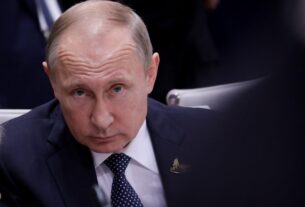VIENNA — The European Union is making a final push to save the Iran nuclear deal, convening all negotiators for an unexpected and sudden resumption of talks on Thursday, three sources familiar with the situation told POLITICO.
The goal — as it has been for months — is to restore a 2015 deal that saw Iran agree to limit its nuclear ambitions in exchange for heavy sanctions relief. The agreement has been all but dead since the U.S. pulled out in 2018. Talks to revive it ran aground earlier this year.
Negotiators are now descending on Vienna to see if there’s any sliver of hope left. Diplomats will be present from the U.S., Iran, China, Russia, Germany, Britain and France, as well as the EU, which is acting as a mediator since Iran refuses to talk directly to the U.S.
Enrique Mora, the senior EU official coordinating the negotiations, confirmed the resumption on Twitter.
It is not yet clear how senior the officials present will be and how long the talks will last. As has been the case for months, meetings will mainly take place at the luxurious Hotel Palais Coburg, located in Vienna’s historic first district. Preparations to reinstall the media tent outside the hotel will also begin today.
Sources familiar with the negotiations played down expectations and cautioned that it was far too early to say whether the talks will be successful. There are still a number of outstanding differences that need to be settled, and it’s unclear whether Iran has shifted its position since a previous round of negotiations fell apart in March.
Still, a draft roadmap on how to achieve a deal has been essentially ready since earlier this year. But Russia’s war in Ukraine, followed by a dispute over whether the U.S. would remove its terrorist designation from an Iranian military unit, have stalled any final agreement.
EU foreign policy chief Josep Borrell made what seemed like a final plea in an opinion piece for the FT in July.
“After 15 months of intense, constructive negotiations in Vienna and countless interactions with the JCPOA participants and the US, I have concluded that the space for additional significant compromises has been exhausted,” Borrell wrote, using the acronym for the deal, formally known as the Joint Comprehensive Plan of Action.
“I have now put on the table a text that addresses, in precise detail, the sanctions lifting as well as the nuclear steps needed to restore the JCPOA,” he added.
Iranian Deputy Foreign Minister Abbas Araghchi (on the right) is greeted by Enrique Mora, Deputy Secretary-General of EEAS (on the left), as he arrives at the Grand Hotel on the day the JCPOA Iran nuclear talks are to resume in 2021 in Vienna, Austria | Thomas Kronsteiner/Getty Images
It is unknown what Iran’s stance is on the latest EU text. In recent statements, Iranian Foreign Minister Hossein Amirabdollahian said that Iran was ready to “discuss further details” in Vienna, thus signaling that Tehran was still not satisfied with the recent draft.
One thorny issue relates to the unexplained presence of uranium particles at various sites in Iran. Since Iran failed to provide credible answers on their presence, the Board of Governors of the International Atomic Energy Agency (IAEA) passed a resolution censuring Iran at the beginning of June. This led Iran to retaliate by switching off IAEA cameras that were used to monitor Tehran’s compliance under the JCPOA. Iran reportedly wants the IAEA probe to be dropped before returning to the JCPOA.
There are also still open questions regarding the scope of sanctions relief as well as Iranian demands for guarantees the U.S. won’t leave the deal again under a new administration.
In recent weeks, there has been growing concern among Western diplomats that upcoming U.S. midterm elections will hand more power to anti-deal Republicans, meaning the political window for resolution may be closing.
Meanwhile, Iran has also continued to enhance its nuclear program. On Monday, Behrouz Kamalvandi, the spokesperson of the Iranian Atomic Energy Organization, announced Iran is activating “hundreds” of new and advanced centrifuges that had previously been installed at Iran’s underground nuclear site in Natanz.
The Iranian announcement came just hours after the U.S. Treasury Department said it would sanction a number of companies used by Iran’s Persian Gulf Petrochemical Industry Commercial Company.
Iran has always maintained that its nuclear program is peaceful and that it has no intention to produce an atomic bomb.



